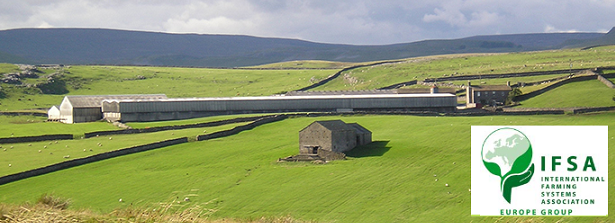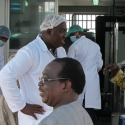Research findings presented at the 12th European IFSA Symposium

Project team members Myrtille Danse and Kelly Rijswijk from the Global Challenges Programme second call project “Bringing food security to scale in Kenya, Ghana, Nigeria and Mozambique: understanding and supporting the role of intermediaries in inclusive business networks” attended the 12th European IFSA Symposium and presented research findings .
Every two years the European department of the International Farming Systems Association (IFSA) organizes a symposium. This year the 12th European IFSA symposium was held at Harpers Adams University in the UK from July 12 to 15 . And just a few days after the Brexit the theme of the symposium could not be more apt, namely “Social and technological transformation of farming systems: Diverging and converging pathways”. It focussed on social and technological transformation – and considered not only what is changing in terms of these dimensions and their contexts, but how they relate to each other and how purposeful social and technological transformation of farming systems in different parts of the world are realized and how they could be brought about in the future. Participants of the symposium were invited to create workshop topics under a set of different themes. One of these workshops was in inclusive innovation, organized by the German Institute for Tropical and Subtropical Agriculture (DITSL), at the Faculty of Organic Agricultural Sciences of the University of Kassel. Four papers were presented within this theme varying from the role of stakeholder analysis to support inclusivity, food security innovations for small-scale farmers in two Tanzanian regions and gender-sensitive approaches to innovation processes with pineapple chain actors in Uganda (click here for more information about these papers).
In this workshop Myrtille Danse presented results from the fast track project that aims to provide a better understanding of the roles of intermediaries in creating viable and scalable inclusive innovations on food and nutrition security that lead to the improved wellbeing of low income actors in local agro-food supply chains in developing countries. The paper titled “Unravelling inclusive business models for achieving food security in low income markets” hence focused on the characteristics of the business models used by the private sector to contribute to food security for low income markets. In the paper five business intervention strategies on food security for low income markets are analysed on business model components, local embedding and innovation strategies and business eco-system building strategies. Important findings are the added value of marketing and distribution strategies for successful business model development on food security, the use of coalition building to overcome institutional and cultural gaps, and the added value of intermediary organisations.






